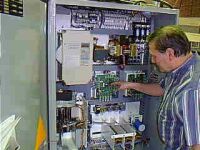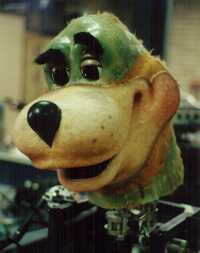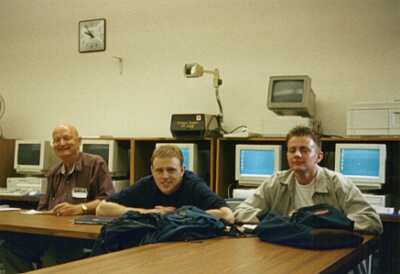
Gordon Young Educational Training Background and Thoughts

 There are many reasons for becoming a professor and I served as
one for over nine years in Manufacturing and Automation Technologies
training
students in electronics, power, robotics, telecommunications, and
hydraulics
and pneumatics. It was extremely interesting to see the different
views of people in a class I developed called "Technology and You" for
non
technology majors. Some take technology for granted and assume
that
it will always develop in the "right" way, and others see it as an
enemy
to be feared. In the 'Technology and You' class, one assignment
was
to invent something and present it to the class. It was
astonishing
to see how after much griping about unfair assignments that weren't
spelled
out in great detail the students broke the seal on their creativity and
came
up with some really good ideas! I have found out that creativity
can be increased greatly in anyone who will open their minds to new
ideas.
There are many reasons for becoming a professor and I served as
one for over nine years in Manufacturing and Automation Technologies
training
students in electronics, power, robotics, telecommunications, and
hydraulics
and pneumatics. It was extremely interesting to see the different
views of people in a class I developed called "Technology and You" for
non
technology majors. Some take technology for granted and assume
that
it will always develop in the "right" way, and others see it as an
enemy
to be feared. In the 'Technology and You' class, one assignment
was
to invent something and present it to the class. It was
astonishing
to see how after much griping about unfair assignments that weren't
spelled
out in great detail the students broke the seal on their creativity and
came
up with some really good ideas! I have found out that creativity
can be increased greatly in anyone who will open their minds to new
ideas.I learned a great deal about how people deal with and accept new technology from the students and that has become very useful to my clients.
Originally, I took the job because I had been told that my Empath (see elsewhere in the site) technology would not be accepted because I had never taught a class before and had no idea what it was like. I planned on staying one year to prove them wrong, but the opportunity to awaken the students to their capabilities in
 creativity kept me there. It is terribly sad that our school systems
generally stifle creativity in students by the time they leave elementary
school and when a college student is faced with a problem where there
are multiple answers possible (some better than others) they often struggle
terribly because they are used to finding the "ONE RIGHT ANSWER" answer!
In my regular automation and electronics classes I tended to give 'take
home' exams with the only instructions that they could seek any outside help
they wanted but could not work together as that only raised the average grade.
(They understood that!) The assignment was to find the best solution
possible and I loved to receive their answers containing real thinking. Some projects
students worked on consisted of developing things like an automated booth
to advertise our department, or a robotic bear mascot for the school.
Innovation can be taught like everything else if it is done right.
creativity kept me there. It is terribly sad that our school systems
generally stifle creativity in students by the time they leave elementary
school and when a college student is faced with a problem where there
are multiple answers possible (some better than others) they often struggle
terribly because they are used to finding the "ONE RIGHT ANSWER" answer!
In my regular automation and electronics classes I tended to give 'take
home' exams with the only instructions that they could seek any outside help
they wanted but could not work together as that only raised the average grade.
(They understood that!) The assignment was to find the best solution
possible and I loved to receive their answers containing real thinking. Some projects
students worked on consisted of developing things like an automated booth
to advertise our department, or a robotic bear mascot for the school.
Innovation can be taught like everything else if it is done right. Perhaps the greatest satisfaction I had in those years was in training a woman who had been an accountant for over 20 years and
 said she was "burned out" and needed a career change to something different.
She said her electronics experience only consisted of knowing how
to "turn on a light switch" but she was willing to learn and had no preconceived
notions of difficulty. By the time she left us two years later, she
had learned to program and develop devices using microcontroller chips and
completed a full course of technical subjects which added considerably to
our robotic capabilities. She was our top student that year using the
exacting and precise work habits she brought from years of accounting greatly
expanded by the liberating creativity she had found in her classes and assignments.
She now works for a high technology composites manufacturing company
and is advancing rapidly.
said she was "burned out" and needed a career change to something different.
She said her electronics experience only consisted of knowing how
to "turn on a light switch" but she was willing to learn and had no preconceived
notions of difficulty. By the time she left us two years later, she
had learned to program and develop devices using microcontroller chips and
completed a full course of technical subjects which added considerably to
our robotic capabilities. She was our top student that year using the
exacting and precise work habits she brought from years of accounting greatly
expanded by the liberating creativity she had found in her classes and assignments.
She now works for a high technology composites manufacturing company
and is advancing rapidly. I had learned that I could make a difference as a teacher in the
lives of my students not because of slavishly following a previously canned course
of instruction, but by opening doors they did not even know
existed! Now I am trying to use what I have learned to
assist organizations to think creatively and to create the best
projects they are capable of.
I had learned that I could make a difference as a teacher in the
lives of my students not because of slavishly following a previously canned course
of instruction, but by opening doors they did not even know
existed! Now I am trying to use what I have learned to
assist organizations to think creatively and to create the best
projects they are capable of.I like the last picture taken in a class when both old and young found something that not only caused them to learn, but to learn something exciting and therefore of true interest!
By the way, I found that I could use Empath technology and that it really did work in teaching at a far lower cost then any other system. Take a look at it and learn!